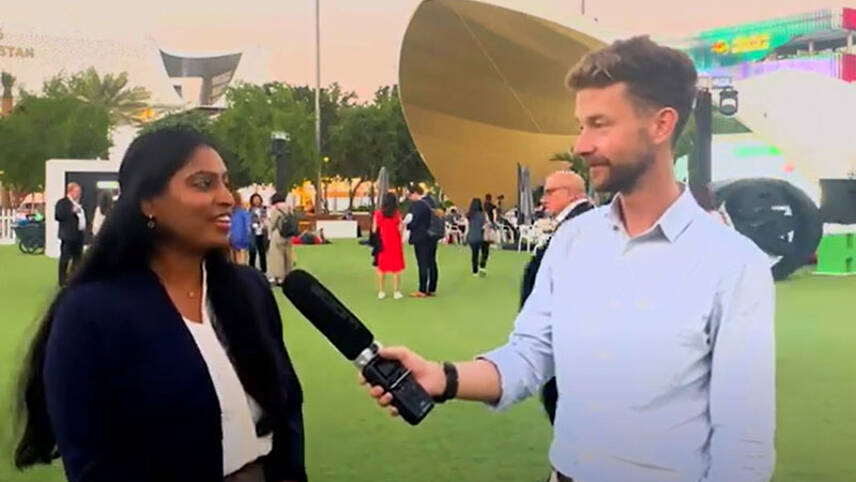Register for free and continue reading
Join our growing army of changemakers and get unlimited access to our premium content
Nawale, who advises bodies including the UN’s climate change arm UNFCCC spoke exclusively with edie’s publisher Luke Nicholls on Tuesday (5 December) at COP28 in Dubai. This was the themed day in the Presidency’s agenda dedicated to energy and the just transition.
Luke asks for her take on the fact that, while more than 120 nations have committed to treble renewable energy generation capacity at COP28, little detail on the practicalities of delivery have been discussed. Moreover, nations are having a challenging time advocating for a strong agreement on fossil fuels in the final text.
Nawale says: “70% of our emissions come from energy, as such. So, really, the key driver has to be the energy and technology sector.
“We’ve talked a little bit about how the supply side needs to move faster but, also, the demand side needs to be addressing some of these challenges, so we’re not causing some of these shocks to the system where the demand goes so high that the supply just can’t reach. Then, once again, you jump to fossil fuels.
“More than anything, it’s [about] the climate finance. It all boils down to how we are getting the funds that are needed to really mobilise projects at the grassroots level in communities where women and vulnerable populations are seeing the impacts of climate change on the adaptation side.
“I think it’s great to have these conversations at the global negotiations level, but it really needs to translate into climate finance. And not just big numbers that are announced… the challenge remains how these numbers are going to translate on the ground.”
Nawale has visited all seven continents on Earth – including Antarctica twice – to deliver talks on climate change. Nawale draws on her previous experience at the Asian Development Bank, where she undertook coordination and advisory work on Just Energy Transition Partnerships (JETP) – whereby wealthy nations collaborate to deliver a finance, technology and knowledge package to an emerging or developing market. A well-known JETP is the $20bn package intended to support Indonesia’s transition away from coal.
While she believes these packages are necessary, she acknowledges that those working in climate in both the Global North and Global South are growing frustrated with “the stalemate within the whole energy and politics system”. Nawale calls on listeners to identify and enhance their influence and impact.
She states: ““We, essentially, need champions. We need champions in businesses, we need champions in local authorities as the UK’s Mission Zero report says. We also need champions in local communities – especially women. And, more than anything else, I think we need to champion ourselves.”
Champions have roles at all levels, including advocacy, delivery, communications and accountability, she explains.
edie at COP28
Want more exclusive content from the grounds of COP28? edie is running a daily podcast show live from the ground in Dubai, featuring exclusive interviews with some of sustainability’s sharpest minds. Check out the COP28 Covered podcast here.
We’re also running a live blog during COP28. From a rousing speech from King Charles to new international declarations on health and agriculture, the COP28 Live Blog gives you everything you need to know about each day at the Summit.
View all of edie’s COP28 content here.



Please login or Register to leave a comment.